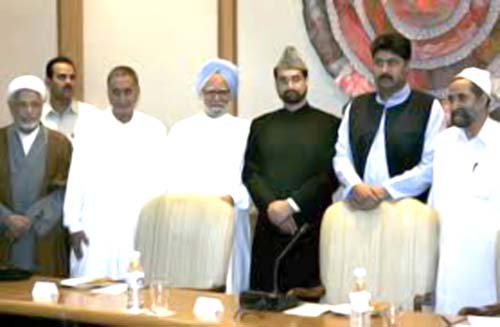
In 1991, as India faced a severe economic crisis, the then newly elected Prime Minister P V Narasimha Rao, who once set “Sky as the limit” for Kashmiris, surprisingly inducted then apolitical Singh into his cabinet as Finance Minister. Over the next few years, despite strong opposition, he as a Finance Minister carried out several structural reforms that liberalized India’s economy. Although these measures proved successful in averting the crisis, and enhanced Singh’s reputation globally as a leading reform-minded economist, the incumbent Congress party fared poorly in the 1996 general election. Subsequently, Singh served as Leader of the Opposition in the Rajya Sabha during the Atal Bihari Vajpayee government of 1998–2004.
In 2004, when the Congress-led United Progressive Alliance (UPA) came to power, its chairperson Sonia Gandhi relinquished the premiership to Manmohan Singh. Manmohan Singh led UPA government inherited dialogue process with Kashmiri moderate separatists from former NDA government, bearing no fruits till date.
“We have put forward some suggestions before the prime minister of India who promised a positive approach but instead of accepting them the government of India performed its rhetorical attitude towards Kashmir,” stated Hurriyat (M) Chairman, Mirwaiz Umar Farooq many times while talking about the dialogue with GoI.
Although India’s economy grew rapidly under UPA-I led by Dr Manmohan Singh, but it could not move forward on Kashmir front despite the fact that the 2009 general election saw the UPA return with an increased mandate, with Manmohan Singh retaining the office of Prime Minister.
The Prime Minister Dr Manmohan Singh on May 26, 2006 announced the setting up of five working groups to resolve the issues confronting Jammu and Kashmir.
It was claimed that the groups would help in improving the Centre-State relations, furthering the relationship across the Line of Control (LoC), giving a boost to State’s economic development, rehabilitating the destitute families of militants and reviewing the cases of detainees and ensuring good governance.
The announcement was made at the end of the second two-day round table conference in Srinagar, which was boycotted and strongly criticized by all the separatist leaders in one voice. The first round table was conducted in New Delhi.
Dr Singh had said the groups will submit reports to the Government and the reports would be discussed in the third round table.
The groups that were to deal with the confidence building measures across the segments of society in the State comprised of those members present at the conference, or those nominated by parties and groups.
The measures that would be taken up by the groups included improving the condition of people affected by militancy, evolving schemes to rehabilitate all orphans and widows affected by militancy, relaxing the conditions for those who had foresworn militancy and providing employment to Kashmiri Pandits.
The steps to improve relations across the LoC included simplifying the procedures to facilitate travel, increasing goods traffic, opening new routes such as Kargil-Skardu, and expanding people-to-people contacts, including promotion of pilgrimage and group tourism.
Without mentioning the autonomy demand (by the National Conference) and self-rule (by the PDP), the fifth group had to study matters relating to the State’s special status within the Indian Union and methods of strengthening democracy, secularism and the rule of law in the State.
The Prime Minister had to cut short his visit and decided to give up his plan of spending an evening watching the waters of Dal Lake from Raj Bhavan in view of the media reports that tight security during his visit was causing inconvenience to tourists.
However, the most critical of the working group set up by Prime Minister Manmohan Singh to improve relations between Jammu and Kashmir and the central government did not meet for over first two years, putting a question mark on seriousness of the authorities in initiating confidence building measures to tackle the Kashmir problem.
The group, headed by retired Supreme Court judge, Justice Sageer Ahmed, met on September 3, 2007 but failed to come up with any recommendations because too many members were pulling in too many directions.















